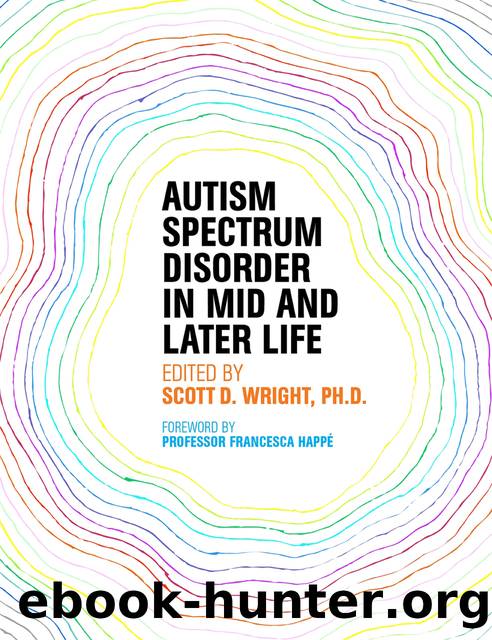Autism Spectrum Disorder in Mid and Later Life by Scott D. Wright

Author:Scott D. Wright
Language: eng
Format: epub
ISBN: 9781784500375
Publisher: Jessica Kingsley Publishers
Published: 2016-01-04T16:00:00+00:00
Factors influencing older parentsâ beliefs about inclusion
Avoiding crises
Communication difficulties and challenging behaviors are frequently experienced by adults with autism (Seltzer et al. 2004). As a result, their older parents often describe community participation as problematic (Hines et al. 2011; Hines, Balandin and Togher 2012) and may seek avoidance of social situations as a way in which to manage the symptoms of autism displayed by their son or daughter. In doing this, they aim to promote their offspringâs happiness and well-being rather than their opportunities for social interaction which parents may view as stressful for all concerned.
Crisis, such as escalation in violent behavior, is a common experience for adults with autism and their families (White et al. 2012), and may be understood by some older parents as the consequence of their failing to manage their sonâs or daughterâs challenging and stereotypical behaviors, difficulties with communication and social interaction, and preference for routines (Hines et al. 2012). Most of the older parents in our studies recounted traumatic incidents where their son or daughter displayed violent or offensive behavior towards others, including those in the community. One mother said:
The people at the railway station asked for his ticket and he couldnât find it. And they asked him could they look in his wallet, which he never liked anyone touching him really, you know, far less his wallet. And so the guy said you know, âCome hereâ. And they got really very nasty. And so he actually punched them. And then they ran across the highway after him. It was a huge thing. (Hines et al. 2011, p.260)
Given their firsthand experience of the distressing consequences of challenging behaviors occurring in the community, older parents may come to the conclusion that community inclusion is simply not worth the risk. Faced with the challenge of managing these behaviors in the community, older parents may instead decide to utilize avoidance strategies and insulate and indeed isolate their son or daughter from the community. For instance, after describing the devastating consequences of an escalation in her sonâs challenging behaviors, one mother described how she relied on avoidance strategies. She said: âIâm not game to force him to do things. Iâm really notâ (Hines 2009, p.71). Thus, older parents may use avoidance strategies because they have few other resources. Reliance on avoidance strategies may therefore also reflect older parentsâ lack of knowledge of viable alternatives for dealing with their sonâs or daughterâs behaviors.
Download
This site does not store any files on its server. We only index and link to content provided by other sites. Please contact the content providers to delete copyright contents if any and email us, we'll remove relevant links or contents immediately.
I Capture the Castle by Dodie Smith(2038)
The Heavy by Dara-Lynn Weiss(1810)
Aspergirls by Rudy Simone(1699)
Be Different by John Elder Robison(1650)
Autism's False Prophets by Paul A. Offit(1538)
My Child's Different by Elaine Halligan(1516)
Smart but Scattered—and Stalled by Richard Guare(1501)
101 Tips for the Parents of Boys with Autism by Ken Siri(1495)
Asperger Syndrome (Autism Spectrum Disorder) and Long-Term Relationships by Ashley Stanford(1427)
What's Making Our Children Sick? by Michelle Perro(1416)
ADHD by Mark Selikowitz(1394)
Girlish by Lara Lillibridge(1388)
On Immunity: An Inoculation by Biss Eula(1362)
An Adult with an Autism Diagnosis by Gillan Drew(1355)
Nerdy, Shy, and Socially Inappropriate by Cynthia Kim(1352)
Animal-assisted Interventions for Individuals with Autism by Temple Grandin(1332)
The Cities by K.A Knight(1317)
Sarah's Child (Hqn Romance) by Linda Howard(1314)
Seeing Ezra by Kerry Cohen(1307)
